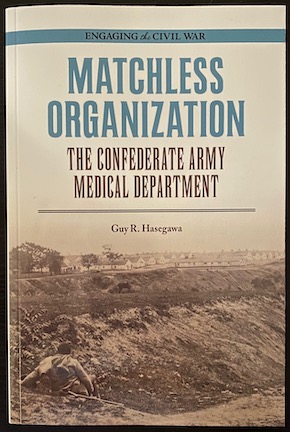Now Available: Matchless Organization: The Confederate Army Medical Department
 We’re excited to announce the release of the next book in the Engaging the Civil War Series, published by Southern Illinois University Press: Matchless Organization: The Confederate Army Medical Department by Guy Hasegawa. Matchless Organization is “the essential reference about a surprisingly well-organized medical department.” (see here for ordering info from SIUP)
We’re excited to announce the release of the next book in the Engaging the Civil War Series, published by Southern Illinois University Press: Matchless Organization: The Confederate Army Medical Department by Guy Hasegawa. Matchless Organization is “the essential reference about a surprisingly well-organized medical department.” (see here for ordering info from SIUP)
The story of the Confederate medical department is, in its way, a dark horse story–after all, who typically conjures phrases like “matchless organization” when they think of the Confederate government? “The Southern states faced the unfamiliar circumstances of being primarily on the defensive and largely deprived of traditional sources of supply, the latter complicated by the lack of a robust industrial base and what would become a crippling inflation rate,” Guy points out.
As a result, he says, “How the Medical Department of the Confederate army operated is a story of improvisation and reaction to circumstances.”
Figures like Jonathan Letterman, Clara Barton, and Hunter Holmes McGuire typically get all the plaudits when it comes to Civil War medicine, but Matchless Organization brings to the forefront the incredible skill—as a physician and a bureaucrat—of Samuel Preston Moore, who built a medical service from scratch. Largely an unsung hero, Preston’s ability to rise to the occasion allowed hundreds of thousands of men to receive care and comfort.
Matchless Organization is readable and fascinating.
About the Book:
Despite the many obstacles it had to overcome—including a naval blockade, lack of a strong industrial base, and personnel unaccustomed to military life—the Richmond-based Confederate Army Medical Department developed into a robust organization that nimbly adapted to changing circumstances. In the first book to address the topic, Guy R. Hasegawa describes the organization and management of the Confederate army’s medical department. At its head was Surgeon General Samuel Preston Moore, a talented multitasker with the organizational know-how to put in place qualified medical personnel to care for sick and wounded Confederate soldiers.
Hasegawa investigates how political considerations, personalities, and, as the war progressed, the diminishing availability of human and material resources influenced decision-making in the medical department. Amazingly, the surgeon general’s office managed not only to provide care but also to offer educational opportunities to its personnel and collect medical and surgical data for future use, regardless of constant and growing difficulties.
During and after the war, the medical department of the Confederate army was consistently praised as being admirably organized and efficient. Although the department was unable to match its Union counterpart in manpower and supplies, Moore’s intelligent management enabled it to help maintain the fighting strength of the Confederate army.
About the Author:
Guy R. Hasegawa, a retired pharmacist and editor, is the author of Villainous Compounds: Chemical Weapons and the American Civil War and Mending Broken Soldiers: The Union and Confederate Programs to Supply Artificial Limbs.
I was quite surprised at the efficiency of the Confederate medical department when I came across it in my own studies. This book sounds great! Looking forward to reading it!
Outstanding! I’m looking forward to reading it. I was part of a small team who recently created a NEW permanent NPS exhibit at Ellwood Manor, featuring the Confederate hospital there during the battle of Chancellorsville. Our team continues to research the Confederate casualties & hospitals of the CS 2nd Corps after a very costly victory resulting in the bloodiest morning of the Civil War on the third day. I would like to invite everyone to visit Ellwood Manor which is now open to the public. http://www.fowb.org/index.php/ellwood-manor/the-visitors-experience/hospital-room/
Good to know. I have fallen victim to the overwhelming favorable publicity of the North’s practices.